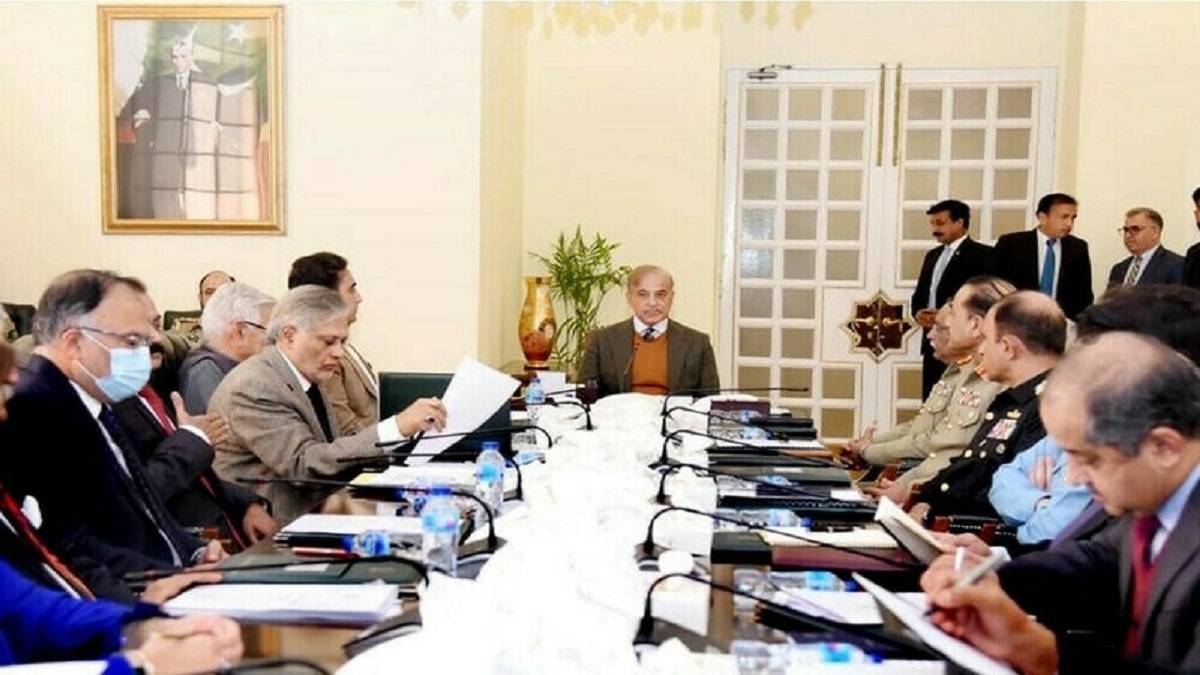The federal cabinet, led by Prime Minister Shehbaz Sharif, approved the decisions taken at the National Security Committee (NSC) meeting, which included the trial of protesters who ransacked and vandalized military installations on May 9 under the Army Act and Official Secrets Act.
The approval for trying civilians in military courts comes just days after the NSC and the Corps Commanders’ Conference pledged to bring those responsible for the violent protests to justice.
On May 9, widespread protests erupted after the paramilitary Rangers arrested Pakistan Tehreek-e-Insaf (PTI) chief Imran Khan from the premises of the Islamabad High Court (IHC).
During the protests, public and state properties were vandalized, and even the General Headquarters in Rawalpindi and Lahore Corps Commander’s residence were attacked. A subsequent crackdown on PTI leaders and workers has been ongoing.
While speaking anonymously, a key cabinet minister informed The Express Tribune that no new military courts would be established, and the accused would be tried in “special standing courts” that are already operational under the military act.
However, Colonel (retired) Inamur Rahim, a renowned lawyer and military-related cases expert, stated that the defense ministry or the Chief of Army Staff (COAS) would need to issue a formal notification for the establishment or revival of the special standing courts.
“The federal government has already empowered the army chief to constitute or issue a warrant to any formation commander to constitute special standing courts,” Rahiem explained, adding that the military typically establishes courts within the respective units for crimes committed in those units.
Once the special standing courts are established, they can operate throughout the year in one city or multiple cities. Rahiem recalled that special standing courts were previously set up in Karachi’s Malir area in 2005-06 due to the city’s law and order situation.
The federal cabinet approved the decisions taken in the NSC meeting on May 16, according to the official statement. In addition to approving trials in military courts, the NSC stressed the need for political dialogue to resolve differences instead of confrontation.
The defense minister could not be reached for comments regarding the establishment of the special standing courts.
During the cabinet meeting, PM Shehbaz briefed the members about his visit to the Pak-Iran border, highlighting the completion of a project for importing 100 megawatts of affordable electricity from Iran. He noted that the project would provide electricity to South Balochistan, especially Gwadar, and bring development and prosperity to the backward areas of Balochistan.
The “Mand-Pishin Border Market” was also inaugurated, aiming to create new business and employment opportunities for residents on both sides of the Pak-Iran border. The premier mentioned that Iran’s President expressed special interest in promoting trade between Pakistan and Iran. Discussions were held on cooperation in agriculture, science and technology, and solar energy, and a delegation led by the foreign minister will visit Iran soon.
Furthermore, both countries emphasized joint efforts to prevent cross-border terrorism along the 900-mile long border and agreed to enhance the security system. PM Shehbaz invited the Iranian president to visit Pakistan, and the invitation was accepted.
The cabinet also discussed the “Road to Makkah” agreement signed with Saudi Arabia, which will benefit a significant number of Pakistani pilgrims. Under the agreement, the immigration process of 26,143 Pakistani pilgrims will be completed at Islamabad airport, eliminating the need for them to wait at Saudi airports. The implementation of the agreement started on May 18, and it is expected to be extended to pilgrims departing from Lahore and Karachi next year with the support of the Saudi government.
Moreover, the federal cabinet approved the establishment of an Insurance Tribunal in Rawalpindi. The existing accountability court No.4 will be converted into an insurance tribunal, resulting in no additional expenses. The decisions made by the Cabinet Committee on Legislative Cases on May 11 were also approved.



























